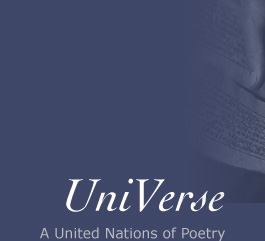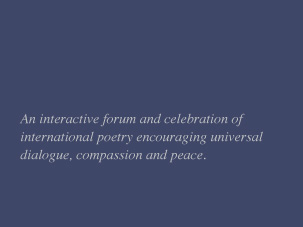| |
 |
 |
 |
Meena Alexander was born in Allahabad, India, raised in India and Sudan. When she was eighteen she went to study in England. She now lives in New York City, where she is a Distinguished Professor of English at Hunter College and the Graduate Center at the City University of New York. Her eight volumes of poetry include the collections, Illiterate Heart (2002), which won a 2002 PEN Open Book Award, and Raw Silk (2004). She is the editor of Indian Love Poems (2005). Her new volume of poems Quickly Changing River will appear in Fall 2007. Her work has been widely anthologized and translated. Much of her work is concerned with migration and its impact on the writer's subjectivity, and with the sometimes violent events that compel people to cross borders. Alexander has produced the acclaimed autobiography, Fault Lines (1993), chosen as one of Publishers Weekly’s Best Books of 1993, and revised in 2003 to incorporate significant new material. She has also published two novels, Nampally Road (1991) and Manhattan Music (1997); a book of poems and essays, The Shock of Arrival: Reflections on Postcolonial Experience (1996); and two academic studies, one of which is Women in Romanticism: Mary Wollstonecraft, Dorothy Wordsworth, and Mary Shelley (1989). She is currently at work on a new collection of poems and a volume of notes and essays on poetry, migration and memory.
|
 |
 |
English
version
Muse
I was young when you came to me.
Each thing rings its turn,
you sang in my ear, a slip of a thing
dressed like a convent girl—
white socks, shoes,
dark blue pinafore, white blouse.
A pencil box in hand—girl, book, tree—
those were the words you gave to me.
Girl was penne, hair drawn back,
gleaming on the scalp,
the self in a mirror in a rosewood room,
the sky at monsoon time, pearl slits,
in cloud cover, a jagged music pours:
gash of sense, raw covenant
clasped still in a gold-bound book,
pusthakam pages parted,
ink rubbed with mist,
a bird might have dreamt its shadow there
spreading fire in a tree maram.
You murmured the word, sliding it on your tongue,
trying to get how a girl could turn
into a molten thing and not burn.
Centuries later worn out from travel
I rest under a tree.
You come to me,
a bird shedding gold feathers,
each one a quill scraping my tympanum.
You set a book to my ribs.
Night after night I unclasp it
at the mirror’s edge,
alphabets flicker and soar.
Write in the light
of all the languages
you know the earth contains,
you murmur in my ear.
This is pure transport.
-Reprinted with permission from the author Meena Alexander from
Illiterate Heart, TriQuarterly Books, 2002. www.nupress.northwestern.edu |
 |
 |
English
version
Rites of Sense
In twilight as she lies on a mat
I rub my mother’s feet with jasmine oil,
touch calluses under skin,
joints upholding that fraught original thing—
bone, gristle, skin, all that makes her mine.
All day she swabbed urine from the floor,
father’s legs so weak he clung to the rosewood bed.
She rinsed soiled cloths, hung them out to dry
on a coir rope by a vine, its passion fruit
clumsy with age, dangling.
She lies on a mat, a poor thing beached,
belly slack, soles crossed, sari damp and white.
I kneel in darkness at her side,
her oldest child returned for a few weeks
at summer’s height.
She murmurs my name,
asks in Malayalam, Why is light so hot?
Beyond her spine I catch a candle glisten.
The door’s a frame for something
I’m too scared to name:
a child, against a white wall,
hands jammed to her teeth, lips torn,
breath staggering its hoarse silence.
All night my voice laced through dreams
tiny eyelets for the smoke,
Amma, I am burning!
I’m a voice slit from sound,
just snitches of blood, loopholes of sweat,
a sack of flesh you shut me in.
What words of passage to that unlit place?
What rites of sense?
Amma, I am dreaming myself into your body.
It is the end of everything.
Your pillow stained with white
tosses as a wave might
on our southern shore.
Will you lay your cheek against mine?
Bless my bent head?
You washed me once, gave me suck,
made me live in your father’s house,
taught me to wake at dawn,
sweep the threshold clean of blood-red leaves.
Showed me a patch of earth dug with your hands
where sweet beans grow coiled and raw.
Taught me to fire a copper pan,
starch and fold a sari, raise a rusty needle,
stitch my woman’s breath
into the mute amazement of sentences.
-Reprinted with permission from the author Meena Alexander from
Illiterate Heart, TriQuarterly Books, 2002. www.nupress.northwestern.edu |
 |
 |
English
version
Rumors for an Immigrant
I. Fifth Avenue Plaza
Water slips down a concrete wall.
In the plaza, she touches a metal table, a chair, a notebook.
Noon already, each thing swallows its own shadow
murmuring, I cannot flee you.
She loosens her hair, becomes a woman in a silk sari
on a high balcony, the trellis cut in bone.
Rumors clip the air, spread their wings
and swarm through the plaza.
Suddenly she feels hot.
Draws her hair back, a comb glistens in her hand,
she pulls out a pocket mirror, puckers her lips,
she tries to make small-scale order
(two black eyes, dark skin, two nostrils,
that sort of thing) out of bristling confusion.
II. Central Park
From mouth to shining mouth news darts.
In fields by the river indigo burns.
Ghandi enters Central Park, smoke in his palms.
He raises a charka, a dove coos, fluttering out of his dhoti.
Behind him, pots and pans lashed to bicycle rickshaws,
come the people.
There is no homeland anymore,
all nations are abolished, a young man cries.
In the lake, rumors flicker, make luminous habitation.
Allen Ginsberg leaps from the reeds
holding hands with a young man from Conakry,
dead already, turned into a star,
shot forty-one times by police as he stood in his own doorway.
Gently loiter, he sings.
On his charka, Ghandi strums a tune:
I stop somewhere waiting for you.
III. Notebook
She has heard the rumor no one will have a homeland.
She opens up her notebook,
she wants to flee her past,
she thinks she can live on the white page.
Wo is Heimat?
She murmurs this in a tongue she does not understand.
Wen Beitak? Naad evida?
Sitting very straight she writes in her best hand:
I have floated on the river Spree.
Seen Brecht’s Theater from the outside in,
tucked my body into two suitcases,
with a hole cut between,
hung in a museum at Checkpoint Charlie.
Tired suddenly, she stops writing suddenly, rubs her wrist.
IV. Bodies and Souls
Three months ago she met a man with a hurt wrist.
He used to live not far from Mohenjo Daro.
In her notebook she speaks to him:
I come from where Marco Polo turned,
as for Mohenjo Daro, it is covered in dirt.
The invisible cities burn in me.
Here come under my ribs.
She claps her hand to her lips
lets the wind turn this into a rumor
that reaches Ghandi’s ears.
She whispers the immigrant’s name,
adds, in her mother tongue, Ende priyen!
She feels all her days and her nights are etched
on his lonely skin
in script so exquisite and spare
no one has deciphered it.
In time she will be to him as the air he breathes
so he forgets her utterly,
yet his mouth will be tucked to her ear,
marking a wild rose, her raw lips to his wrist.
-Reprinted with permission from the author Meena Alexander from
Illiterate Heart, TriQuarterly Books, 2002. www.nupress.northwestern.edu |
 |
 |
|
 |
|





